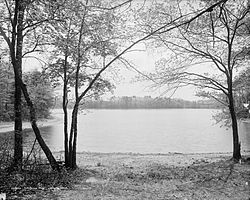by Richard Gwynallen
I have not read anything by or about Thoreau for probably 15 years, and, despite being a collector of quotes, I had forgotten many of the phrases that were meaningful to me in my youth. In fact, it took seeing a review of a new biography of Thoreau to make me realize that this week, the 12th of July to be specific, marked Thoreau’s 200th birthday.
collector of quotes, I had forgotten many of the phrases that were meaningful to me in my youth. In fact, it took seeing a review of a new biography of Thoreau to make me realize that this week, the 12th of July to be specific, marked Thoreau’s 200th birthday.
I read Walden when I was 14. At that time, in the months after my father’s death, my mother was becoming more religious. It fostered changes in our house. She would read the Bible nightly. We all started going to church every Sunday. Over time she became more involved in church committees. I had not been brought up in a religious environment, and once I realized the changes she was going through were serious and permanent, my reaction was a habit I had developed in our traveling – to read a lot. I went to the library near our house and started reading a lot of books and articles on religion to see how I fit into what wasn’t quite comfortable to me.
Enter Walden.
At the same time I was confronting religion I watched the news nightly and read the newspaper accounts of social change vibrating all around my world. Though later I would see limitations to Thoreau’s highly individualistic way of living and responding to social needs, his ideas on civil disobedience were amongst my earliest readings on social change. Also, I was drawn at the time to Thoreau’s personal struggle to stand beyond the conventions of his time, to reconceive life as it existed, to be attentive and appreciative of the natural world, to regard experience of the world as true wealth, and to strive to live out one’s dreams.
Some of the background to Thoreau spoke to the radical consciousness germinating inside me. For instance, Thoreau’s critique of consumption for consumption’s sake, and his abolitionist and anti-war views. However, I think that as a young teen whose life suddenly went through dramatic changes and who was starting to question the society I was growing up in, full of youthful zeal and self-righteous energy, it was more the philosophical and poetic aspect of Thoreau that moved me at the time. The idea of stepping outside one’s comfort zone, beyond the hearth and into the woods, and to fully live the days of one’s life, were concepts that forged a foundation for my own unfolding life.
“I went to the woods because I wished to live deliberately . . . to front only the essential facts of life, and see if I could not learn what it had to teach, and not, when I came to die, discover that I had not lived.”
Instead of success or failure being defined by the wealth and position one achieves, from those early readings I began to see that a common life lived uncommonly could contain spiritual greatness.
“. . . if one advances confidently in the direction of their dreams, and endeavors to live the life which he has imagined, he will meet with a success in common hours.”
And if those struggles seem to not be producing?
“If you have built castles in the air, your work need not be lost; that is where they should be. Now put the foundations under them.”
In other words, we are not required to complete the task, but nor are we free to desist from it. Put the foundations down upon which others can build.
At the time I was reading Walden there were rising trends of what we now think of as lifestyle activism; that to say, seeing vegetarianism or yoga or the like as social change. All of which are good; living one’s values is important. And it seems to fit Thoreau. Instead, Thoreau offered: “Be not simply good, be good for something.” It would be easy to see one’s self as “good” if one were just living doing the right things in one’s daily life. Self-righteousness lurks not far away. It’s not enough to feel good. It’s more worthwhile to do good for something greater than yourself.
And though the encounter between Thoreau and Emerson while Thoreau was in jail for refusing to pay taxes due to his opposition to a war may have been a myth, the presumed exchange still starkly defines the choices we make. Ralph Waldo Emerson was said to have asked him, “Henry, what are you doing in there?” And Thoreau allegedly replied, “Ralph, what are you doing out there?”
Thoreau did not intend that we all live in a cabin by a pond or go through life appearing as as an eccentric, but to examine the values with which we live life, to not substitute material gain and socially defined success for real living, to live that life experiencing and appreciating nature, and to live out those values that shape the world we want.
Nothing in Walden gives one a blueprint for a better world, or provides the foundation for collective movements that create that change, but sometimes it is good to simply get back to basics, to refresh and energize the soul, to ensure we are truly living and not simply sojourning – to go to the woods.
